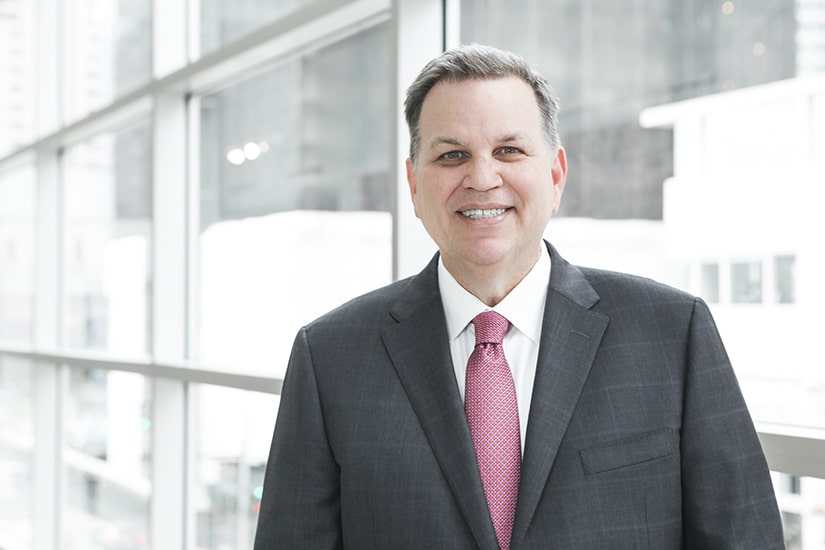
Nine different nurse executives who have served under Chief Nursing Officer Dr. Dale Beatty have gone on to serve as CNOs of other organizations. In a thirty-three-year career, Beatty says that when he self-reflects on his accomplishments, that may top the list. Over the course of three decades, Beatty, now the CNO at Stanford Health, has endeavored to bring awareness of what’s happening on nursing frontlines to the highest levels of the organization, in part to make organizations more responsive to the ever-evolving needs of clinicians and nurses, and also to make those voices better heard in changing and modernizing healthcare systems. Beatty has also demonstrated repeated commitment to discovering, and sometimes rediscovering, just what it means to “bring care to healthcare.”
Beatty transitioned into the healthcare sphere in the early ’80s working in a nursing home and was drawn to the interaction with residents and other caregivers. “It was actually my mother who suggested becoming a nurse,” Beatty says. “The idea was completely out of my paradigm, and when I wound up going to nursing school, I was the only man in my class.” It did little to deter the future CNO, who says the best piece of advice he’s able to offer is to follow one’s passion. “The title and the money will never satisfy you,” Beatty asserts. “It has to be something that you love and have passion for.”
Nearly thirteen years at Northwestern Memorial Hospital provided Beatty the foundation for his future as a CNO. “I had the opportunity to get both a depth and breadth of experiences from critical care, emergency, and trauma services to providing leadership in the interventional platform,” Beatty says. “These professional career development experiences really helped pave the way for my future.”
As CNO of Northwest Community Hospital, Beatty says his direct work with Dr. Kathy Reno was instrumental in providing direction for his future work. In almost eight years, Beatty’s team was recognized as an ANCC Magnet institution, the highest and most prestigious distinction a healthcare organization can receive for nursing excellence. Northwest was also recognized three different times as a Forbes ‘Top 100 Places to Work’ employer. “CEO Bruce Crowther was laser-focused on culture and engagement,” Beatty says. “It taught me the importance of people and developing a culture of engagement that supports system process redesign and helps build better care delivery through their eyes and expertise.”
Northwest Community Hospital is also where Beatty developed a passion for shared leadership, a leadership style he continues to practice at Stanford. “It’s powerful when you are using the organization’s whole brain and expertise,” Beatty says. “You have to bring your experts to the table so the work can be designed, adopted, and accepted.” At Stanford, the shared leadership model engages about 350 frontline staff, helping to design their professional workflows supported by technology and prepare the workforce to move into a new $2.2 billion facility in 2019.
“The title and the money will never satisfy you; It has to be something that you love and have passion for.”
Prior to coming to Stanford, Beatty spent time at the University of Illinois at Chicago working as the organization’s CNO while also pursing his own Doctor of Nursing Practice (DNP) in executive nursing administration. It was a redefining moment for the CNO, who says that he was humbled in realizing that all of his years of learning and experience needed additional academic preparation with the infusion of new, advanced knowledge and evidence. “When I took my first exam, I didn’t do very well,” Beatty admits. “I had to deconstruct some of my prior knowledge and realize that some of the knowledge I had been operating on wasn’t necessarily correct anymore.” Beatty says he is grateful for the opportunity he had at the University of Illinois at Chicago’s College of Nursing, which is one of the top ten DNP programs in the country and is known for its academic rigor.
Beatty’s reeducation of sorts also put him in a classroom with frontline clinicians and nurses who were able to relay their experiences more personally and in a way that would help propel Beatty’s own focus on shared leadership in his later roles. It also opened his eyes to the power of multi-generational workforces. “I found the younger people on my project teams were incredibly resourceful and efficient,” Beatty says. “When you combined that with my experience and application skills, it was a perfect combination. We augmented each other’s skills, knowledge, and abilities.”
In coming to Stanford, Beatty and his team have dived more deeply into the work of Dr. Jean Watson’s Philosophy and Science of Caring. “Our goal is to create transpersonal relationships with our patients, families, and with each other,” Beatty says. “Part of the work really has to do with helping clinicians and nurses to self-reflect and also to provide self-care so that they, in turn, can better care for others.” Beatty says that in a field that is all about caregiving, caregivers have to better understand that they, too, are in need of self-care and that enhancing one’s resilience is critical to the care of self and others. There are now twenty-one certified Caritas Coaches at Stanford, Beatty having completed his own certification in April.
Part of the focus of “Caring Science” is to combat nurse burnout. Coincidentally, or perhaps not, Stanford’s turnover rate is an outlier from most other health organizations whose numbers continue to climb. Stanford is even advancing to its fourth designation as an ANCC Magnet organization. Stanford also participates in the National Database for Nursing Quality Indications survey to measure the satisfaction its nurses and examines ways that it might improve its nursing practice environment.
In all ways, Stanford seems to be as focused on care provider wellness as its CNO has demonstrated, and Beatty says that it’s his job to continue to help lead the way. “You can’t advocate for others what you yourself haven’t done,” Beatty says. “In all things, I’m just grateful for a rewarding career and to be able to help people in meaningful way, period.”

